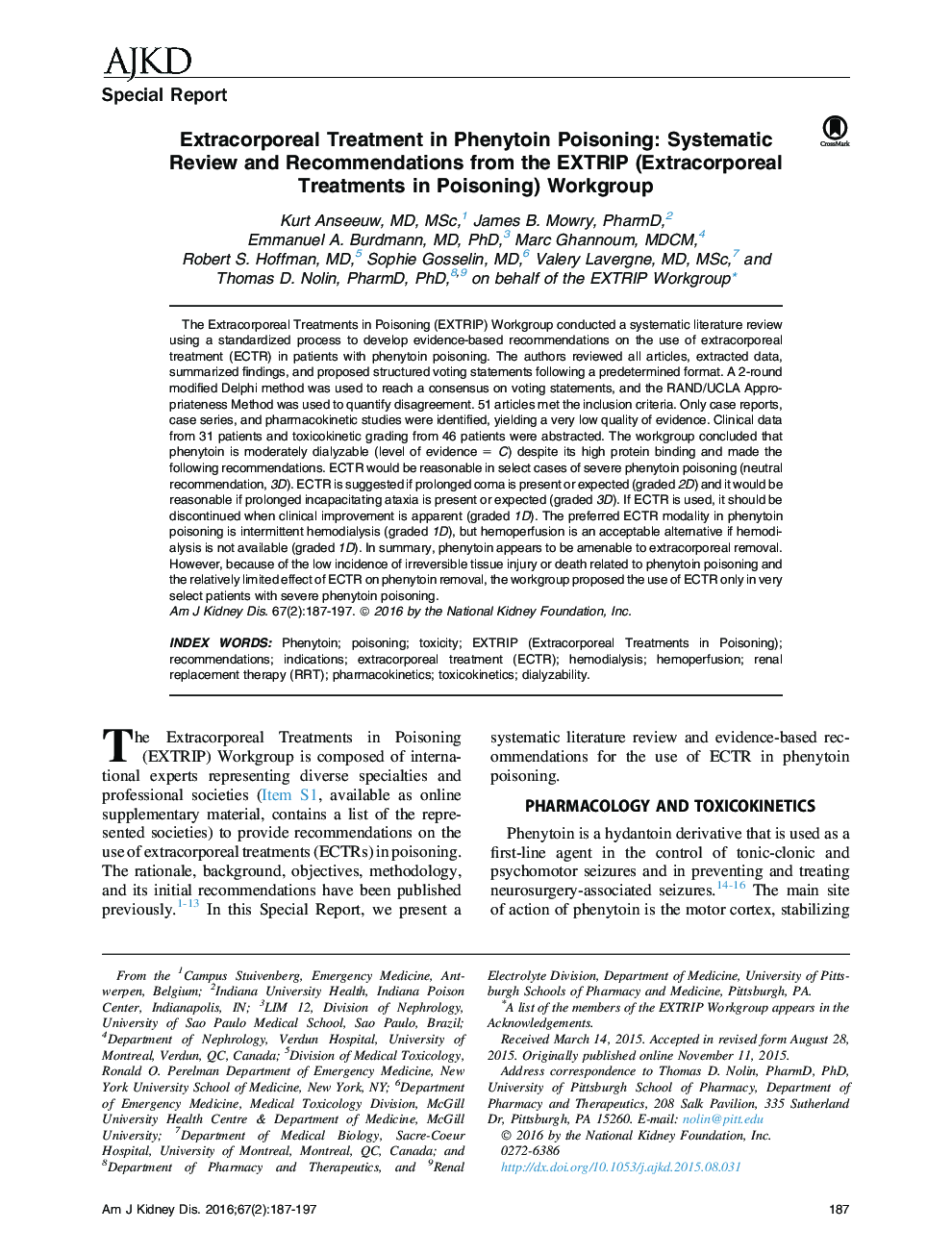| کد مقاله | کد نشریه | سال انتشار | مقاله انگلیسی | نسخه تمام متن |
|---|---|---|---|---|
| 3847727 | 1598245 | 2016 | 11 صفحه PDF | دانلود رایگان |
عنوان انگلیسی مقاله ISI
Extracorporeal Treatment in Phenytoin Poisoning: Systematic Review and Recommendations from the EXTRIP (Extracorporeal Treatments in Poisoning) Workgroup
دانلود مقاله + سفارش ترجمه
دانلود مقاله ISI انگلیسی
رایگان برای ایرانیان
کلمات کلیدی
DialyzabilityToxicokinetics - تاکسیکوسینتیک، تاکسیکوکینتیکrecommendations - توصیه هاrenal replacement therapy (RRT) - درمان جایگزینی کلیه (RRT)Toxicity - سمی بودنIndications - علائمPharmacokinetics - فارماکوکینتیکPhenytoin - فنی توئینPoisoning - مسمومیتHemodialysis - همودیالیزHemoperfusion - هموفرفیوس
موضوعات مرتبط
علوم پزشکی و سلامت
پزشکی و دندانپزشکی
بیماریهای کلیوی
پیش نمایش صفحه اول مقاله

چکیده انگلیسی
The Extracorporeal Treatments in Poisoning (EXTRIP) Workgroup conducted a systematic literature review using a standardized process to develop evidence-based recommendations on the use of extracorporeal treatment (ECTR) in patients with phenytoin poisoning. The authors reviewed all articles, extracted data, summarized findings, and proposed structured voting statements following a predetermined format. A 2-round modified Delphi method was used to reach a consensus on voting statements, and the RAND/UCLA Appropriateness Method was used to quantify disagreement. 51 articles met the inclusion criteria. Only case reports, case series, and pharmacokinetic studies were identified, yielding a very low quality of evidence. Clinical data from 31 patients and toxicokinetic grading from 46 patients were abstracted. The workgroup concluded that phenytoin is moderately dialyzable (level of evidence = C) despite its high protein binding and made the following recommendations. ECTR would be reasonable in select cases of severe phenytoin poisoning (neutral recommendation, 3D). ECTR is suggested if prolonged coma is present or expected (graded 2D) and it would be reasonable if prolonged incapacitating ataxia is present or expected (graded 3D). If ECTR is used, it should be discontinued when clinical improvement is apparent (graded 1D). The preferred ECTR modality in phenytoin poisoning is intermittent hemodialysis (graded 1D), but hemoperfusion is an acceptable alternative if hemodialysis is not available (graded 1D). In summary, phenytoin appears to be amenable to extracorporeal removal. However, because of the low incidence of irreversible tissue injury or death related to phenytoin poisoning and the relatively limited effect of ECTR on phenytoin removal, the workgroup proposed the use of ECTR only in very select patients with severe phenytoin poisoning.
ناشر
Database: Elsevier - ScienceDirect (ساینس دایرکت)
Journal: American Journal of Kidney Diseases - Volume 67, Issue 2, February 2016, Pages 187-197
Journal: American Journal of Kidney Diseases - Volume 67, Issue 2, February 2016, Pages 187-197
نویسندگان
Kurt MD, MSc, James B. PharmD, Emmanuel A. MD, PhD, Marc MDCM, Robert S. MD, Sophie MD, Valery MD, MSc, Thomas D. PharmD, PhD, EXTRIP Workgroup EXTRIP Workgroup,